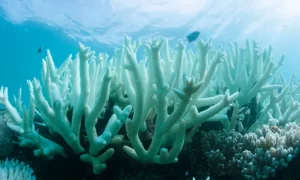by Adam Morton / The Guardian

The Australian Conservation Foundation has filed a court claim arguing the Scarborough gas development will affect the Great Barrier Reef and should be assessed under federal law. Photograph: WWF/Biopixel/PA
An environment group has launched a legal bid to halt a $16bn gas development in Western Australia, arguing the effect of its greenhouse gas emissions on the Great Barrier Reef will be significant and should be assessed under national environment law.
Documents lodged by the Australian Conservation Foundation (ACF) in the federal court on Tuesday said Woodside’s Scarborough gas project would likely affect the 2,300km reef system’s world and natural heritage values by adding to mass coral bleaching.
Woodside needs final approval from the offshore energy regulator, the National Offshore Petroleum Safety and Environmental Management Authority (Nopsema), before the development can go ahead.
ACF said the project’s effect on the reef meant it should lose a legal exemption from national environment laws granted to projects assessed by Nopsema, and instead be considered under the Environment Protection and Biodiversity Conservation (EPBC) Act by the federal environment minister, Tanya Plibersek.
The case is the latest in a growing list testing the approval of Australian fossil fuel developments based on their projected contribution to global heating.
Scarborough has become a rallying point for climate campaigners who cite a warning from scientists and the International Energy Agency that the world cannot afford new large fossil fuel projects if it is to avoid a worsening climate crisis. It involves opening an untapped gas field 375km off WA’s Pilbara coast and connecting it via a pipeline to an expanded liquified natural gas processing plant near the town of Karratha. The bulk of the LNG would be exported and burned in Asia.
Researchers at Climate Analytics have estimated gas from the development could lead to 1.37bn tonnes of carbon dioxide – more than three times Australia’s annual emissions – being released into the atmosphere over 25 years.
Woodside and other project supporters, including WA premier, Mark McGowan, and new federal resources minister, Madeleine King, have argued gas from Scarborough would help lower global emissions by displacing dirtier coal-fired power. They have been asked for evidence to support and quantify this, but none has been released.
ACF’s documents said emissions from Scarborough were likely to increase the average global temperature by at least 0.000394C, which would result in the death of millions of corals in each future mass bleaching event, and would act cumulatively with greenhouse gases already in the atmosphere to contribute to further anthropogenic climate change.
The reef has suffered four mass coral bleaching events since 2016, and scientists say 99% of coral reefs are likely to lost if average heating reaches 2C above pre-industrial levels.
ACF’s chief executive, Kelly O’Shanassy, said if the case was successful it would help establish the idea that all new fossil fuel developments should be assessed for the climate damage they would cause – a point repeatedly made by environmentalists, but which is often not required under Australian law.
She said she expected any assessment would show “new coal and gas does not stack up environmentally”.
“Scarborough’s gas is a climate bomb about to be detonated,” she said. “We must not fall for the accounting trick that suggests these emissions won’t affect reefs in Australia simply because the gas will mostly be burned overseas. The reef is not concerned with the source of the greenhouse gases that damage it.”
Woodside said the Scarborough project had been “the subject of rigorous environmental assessments by a range of regulators” and it would “vigorously defend its position”.
“The Scarborough project is underway and proceeding to schedule after receiving all primary environmental approvals,” the company’s chief executive, Meg O’Neill, said.
“The project will deliver significant local and national benefits in the form of employment, tax revenue and reliable gas supply in the energy transition for decades to come.”
Dr Selena Ward, a senior lecturer at the University of Queensland and director of the Heron Island Research Station on the reef, said a project of Scarborough’s scale would make a difference to global temperatures and it made no sense that it was exempt from the national environment laws.
She said the Great Barrier Reef and other tropical reefs were already “suffering intensely”. “If we want to keep them we can’t afford to approve this sort of project,” she said.
